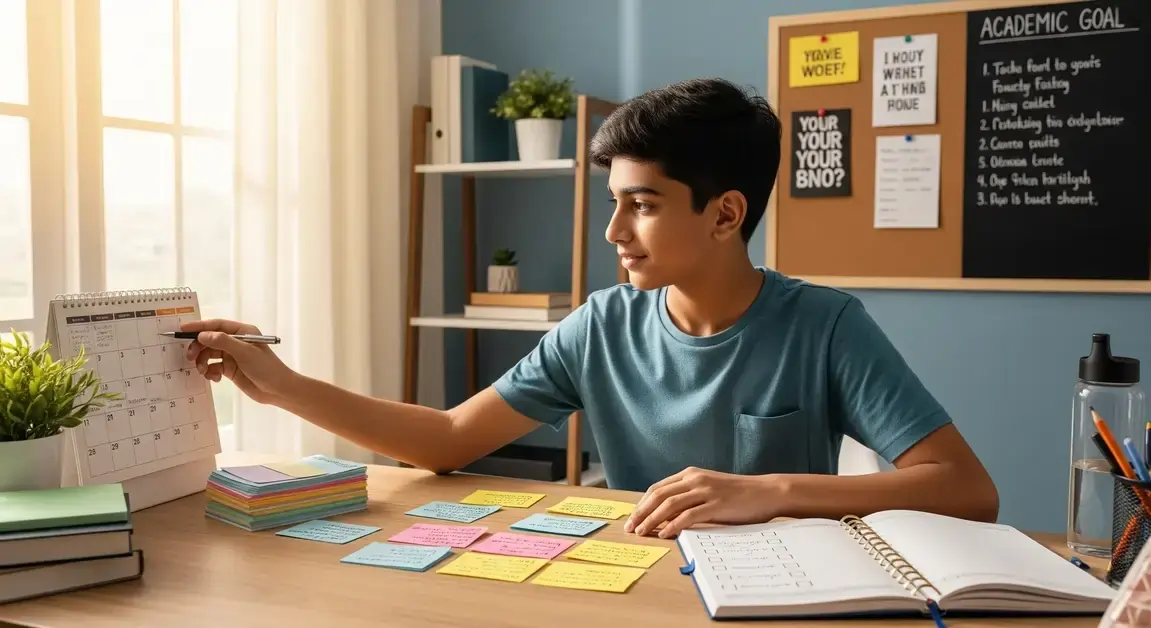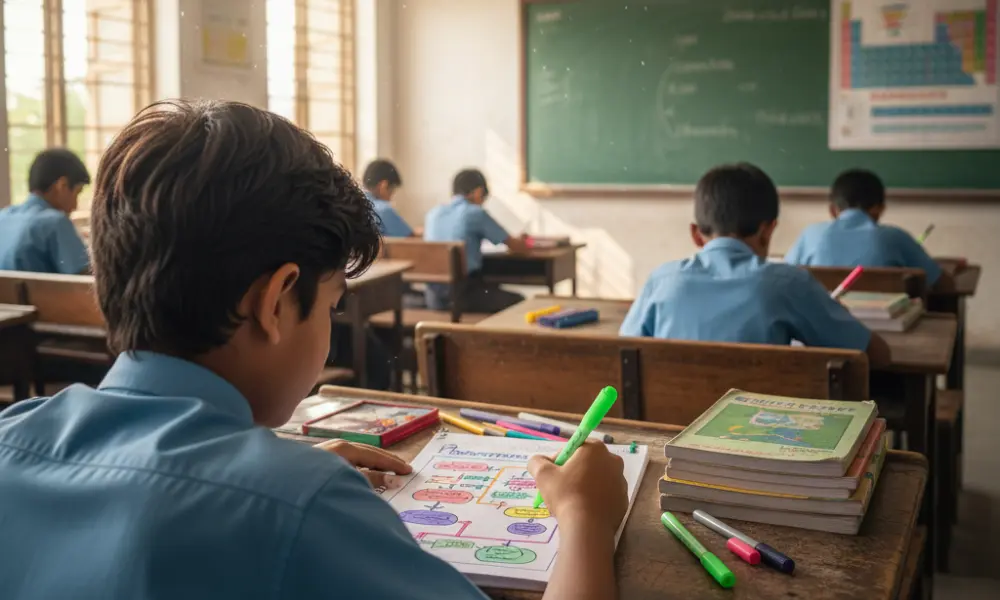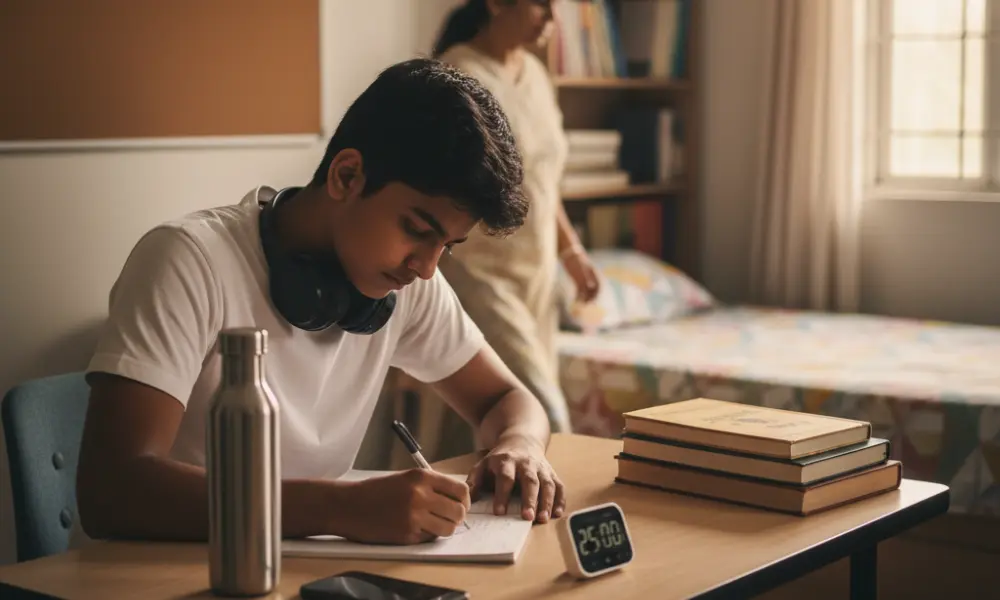Transform your academic journey with science-backed strategies that create lasting study routines
Discover evidence-based techniques to develop consistent study habits that actually stick. This comprehensive guide helps CBSE students and parents understand habit formation psychology and implement practical strategies for long-term academic success. Learn how to work with your natural tendencies to build sustainable learning routines.

Every parent has witnessed it: their child starts the school year with grand plans to study every day, only to watch those intentions fade within weeks. The problem isn't lack of motivation or intelligence—it's that most students don't understand how habits actually form and stick. For CBSE students facing the pressures of board exams and competitive entrance tests, building sustainable study habits isn't just helpful; it's essential for long-term academic success.
The good news? Science has unlocked the secrets of habit formation, and when applied correctly, these principles can transform any student's approach to learning. This guide will walk you through evidence-based strategies that work with your brain's natural tendencies, not against them.
Before diving into strategies, it's crucial to understand what makes habits stick. Research by MIT neuroscientists reveals that habits operate through a three-part loop: cue, routine, and reward. This "habit loop" becomes so automatic that our brains literally go into autopilot mode when triggered.
For students, this means that successful study habits aren't about willpower—they're about designing the right environmental cues and reward systems. When a student sits at their designated study desk (cue), opens their textbook (routine), and feels the satisfaction of understanding a concept (reward), their brain begins to automate this sequence.
The key insight here is that habits take an average of 66 days to become automatic, according to research published in the European Journal of Social Psychology. This timeline varies based on complexity, but it means students need patience and consistency rather than perfection from day one.
Your brain physically changes when you form new habits. This process, called neuroplasticity, means that repeated study behaviors literally rewire neural pathways. For CBSE students, this is encouraging news—every day you practice good study habits, you're making them easier to maintain tomorrow.
The brain's prefrontal cortex, responsible for decision-making and self-control, becomes less active as habits strengthen. This is why experienced students can sit down and start studying without the internal debate that beginners face. The behavior becomes as automatic as brushing teeth.
Not all students learn the same way or at the same times. Understanding your chronotype—your natural sleep-wake cycle—can dramatically improve study effectiveness. Research shows that academic performance can vary by up to 20% depending on whether study times align with your biological prime time.
Most teenagers are naturally "evening types," with peak alertness occurring later in the day. However, CBSE exam schedules often favor morning testing, creating a mismatch. The solution isn't to fight your natural tendencies entirely, but to gradually shift your optimal study time while working with your current patterns.
While learning styles theory has limitations, students do benefit from understanding their preferences:
Visual learners benefit from mind maps, diagrams, and color-coded notes
Auditory learners retain information better through discussions, recordings, and verbal repetition
Kinesthetic learners need movement, hands-on activities, and frequent breaks
Reading/writing learners prefer traditional note-taking and written exercises
The most effective approach combines multiple modalities. For instance, a student preparing for CBSE Physics might create visual diagrams, explain concepts aloud, and solve problems by hand—engaging visual, auditory, and kinesthetic channels simultaneously.
Start by tracking your energy levels for one week. Note when you feel most alert, when you experience energy dips, and when you naturally feel sleepy. Most students discover they have 2-3 peak focus periods daily, typically lasting 90-120 minutes each.
For CBSE students juggling multiple subjects, schedule your most challenging topics during peak energy periods. Use lower-energy times for review, note organization, or lighter subjects. This approach maximizes your brain's natural efficiency patterns.
Your physical environment shapes your mental state more than you might realize. Research in environmental psychology shows that specific environmental factors can improve focus by up to 25%. The key is creating spaces that signal "study time" to your brain.
Start with lighting. Natural light is ideal, but if that's not available, use bright, white light that mimics daylight. Warm, dim lighting signals relaxation to your brain—exactly what you don't want during study sessions. Many successful CBSE students invest in a good desk lamp that provides consistent, bright illumination.
Even in small homes, try to designate a specific area exclusively for studying. This doesn't require a separate room—even a particular corner of your bedroom can work. The goal is training your brain to associate this space with focused work.
Keep this space organized and free from distractions. Remove items unrelated to studying, and ensure all necessary materials are within arm's reach. Every time you have to search for a pen or calculator, you break your focus and make it harder to re-engage with the material.
Smartphones are the biggest threat to sustained focus. Research by the University of California, Irvine found that it takes an average of 23 minutes to fully refocus after a digital interruption. For CBSE students, this means a single text message can derail nearly half an hour of productive study time.
Create a "phone parking" system where your device charges in another room during study sessions. If you need internet access for research, use website blockers to prevent social media access. Many students find success with apps like Cold Turkey or Forest, which gamify the process of staying focused.
One of the biggest mistakes students make is believing that marathon study sessions are more effective than consistent, shorter periods. Cognitive science research consistently shows that distributed practice—spreading learning over time—produces better long-term retention than massed practice (cramming).
This principle, known as the "spacing effect," means that studying Mathematics for 45 minutes daily for seven days will produce better results than studying for five hours in one day. The brain needs time between sessions to consolidate information and form lasting memories.
Research supports study sessions of 25-50 minutes followed by 5-10 minute breaks. This aligns with your brain's natural attention spans and prevents mental fatigue. During breaks, avoid screens and instead opt for light physical activity, which increases blood flow to the brain and improves subsequent focus.
For CBSE board preparation, this might mean tackling one Chemistry chapter section per session rather than attempting entire chapters. You'll retain more information and feel less overwhelmed by the material.
Focus on maintaining daily study streaks rather than perfect performance. Missing one day doesn't ruin your progress, but missing two days in a row can break momentum. This "never miss twice" principle, popularized by habit researchers, prevents single lapses from becoming long-term setbacks.
Track your streaks visually using a calendar or habit tracking app. The psychological satisfaction of maintaining streaks becomes a powerful motivator, especially during challenging periods leading up to board exams.
CBSE syllabi can feel overwhelming when viewed as complete entities. The solution lies in systematic breakdown—transforming massive goals into daily, actionable tasks. This approach, based on project management principles, makes progress visible and maintains motivation.
Start with your biggest goal (such as "master CBSE Physics Class 12") and work backward. Break this into units, then chapters, then individual topics, and finally daily study targets. Each level should feel achievable within the designated timeframe.
Apply the SMART criteria to each study goal:
Specific: "Complete thermodynamics problems" rather than "study physics"
Measurable: "Solve 15 numerical problems" gives clear progress indicators
Achievable: Goals should stretch you without being impossible
Relevant: Focus on topics that appear frequently in CBSE exams
Time-bound: "Complete by Friday" creates urgency and structure
This framework transforms vague intentions into concrete action plans that your brain can easily process and execute.
When building new study habits, start with versions that take less than two minutes to complete. Want to develop a reading habit? Begin with reading just one page daily. This principle, developed by habit researcher James Clear, works because it's impossible to fail at such small tasks.
Once the two-minute version becomes automatic, gradually increase the duration. Many students find that starting with "just open the textbook" leads naturally to longer study sessions, but the low barrier to entry prevents procrastination.
While technology can distract, when used strategically, it becomes a powerful ally in habit formation. Modern habit tracking apps provide immediate feedback, which psychological research shows is crucial for behavior change.
Choose simple tracking methods over complex systems. A basic checklist app or even a physical calendar often works better than elaborate digital solutions. The key is consistency in tracking, not sophistication of tools.
Several apps specifically support student habit formation:
Forest: Gamifies focus time by growing virtual trees during study sessions
Habitica: Turns habit building into a role-playing game with rewards and consequences
Google Calendar: Simple but effective for scheduling consistent study blocks
Notion: Combines note-taking, task management, and habit tracking in one platform
The best tool is the one you'll actually use consistently. Start simple and only add complexity if it genuinely improves your system.
AI-powered learning platforms like Edzy are revolutionizing how students build study habits by providing personalized feedback and adaptive difficulty levels. These systems track your progress across multiple subjects and suggest optimal study schedules based on your performance patterns.
The gamification elements in these platforms tap into the same psychological principles that make habits stick—immediate rewards, progress visualization, and social accountability through leaderboards and peer comparison.
Every student faces obstacles when building new habits. The difference between success and failure often lies not in avoiding setbacks, but in how you respond to them. Research in resilience psychology shows that students who expect obstacles and plan for them are significantly more likely to maintain long-term habits.
Common obstacles for CBSE students include exam stress, social pressures, family expectations, and seasonal motivation dips. Recognizing these patterns allows you to prepare specific strategies for each challenge.
After initial enthusiasm, most students hit a plateau where progress feels slow or invisible. This is normal and predictable—your brain is consolidating new neural pathways during these periods. Understanding that plateaus are part of the process, not signs of failure, helps maintain motivation during difficult phases.
During plateaus, focus on process rather than outcomes. Celebrate showing up and following your routine, even when results aren't immediately visible. Trust that consistent effort will eventually yield breakthrough moments.
CBSE board exams create intense pressure that can disrupt established study habits. Students often abandon their regular routines in favor of panic-driven cramming sessions. Instead, use pressure as a cue to double down on your established habits—they become even more valuable during stressful periods.
Create "pressure protocols"—specific versions of your habits designed for high-stress periods. This might mean shorter but more frequent study sessions, or focusing on review rather than new material learning. Having predetermined strategies prevents stress-induced decision paralysis.
Building habits that last beyond school requires thinking systematically about your learning journey. The habits you develop now will influence your success in college, competitive exams, and professional life. This long-term perspective transforms daily study sessions from chores into investments in your future self.
Focus on developing "meta-learning" skills—the ability to learn how to learn. These include self-assessment, strategic planning, and adaptive thinking. Unlike subject-specific knowledge, these skills transfer across all domains of life.
Implement regular review cycles where you assess and adjust your study habits. Monthly reviews work well for most students—frequent enough to catch problems early, but not so often that you're constantly changing systems.
During reviews, ask specific questions: Which habits felt effortless this month? Where did you struggle most? What environmental factors helped or hindered your progress? Use these insights to refine your approach gradually.
The strongest predictor of long-term habit maintenance is identity alignment. Students who see themselves as "someone who studies daily" maintain habits more easily than those who view studying as something they have to do.
This identity shift happens gradually through consistent actions. Each day you follow your study routine, you reinforce the identity of being a disciplined learner. Over time, this internal narrative becomes self-reinforcing, making habits feel natural rather than forced.
The study habits you develop now will serve you in competitive exams like JEE, NEET, or CAT, and throughout your professional career. Focus on developing transferable skills like time management, systematic note-taking, and consistent daily practice rather than just memorizing CBSE content.
Consider how successful professionals in your field of interest approach learning and skill development. Many top performers in every field share similar habits: consistent daily practice, systematic skill building, and continuous learning. Starting these patterns now gives you a significant advantage.
Remember that building lasting study habits is a marathon, not a sprint. Focus on small, consistent improvements rather than dramatic changes. Trust the process, be patient with yourself during setbacks, and celebrate the gradual transformation from someone who struggles with studying to someone for whom effective learning is simply a natural part of life.
Your academic success isn't determined by innate ability or perfect conditions—it's built through the daily choices you make about how to approach learning. With the right habits in place, you're not just preparing for CBSE exams; you're developing the foundation for lifelong learning and achievement.

How to Build a Realistic Daily Study Routine for CBSE Class 10 Without Burnout
Design a balanced study routine for Class 10 students to thrive without stress.

How to Use Visualization for Better Concept Retention
Unlocking the power of visualization for effective learning

The Power of Self-Assessment: How to Evaluate Your Learning Progress
Unlock your potential through effective self-assessment strategies.

How to Stay Focused While Studying at Home
Master your study time with effective focus techniques.